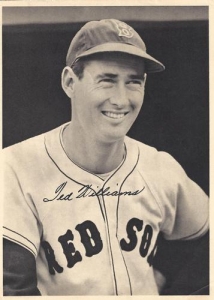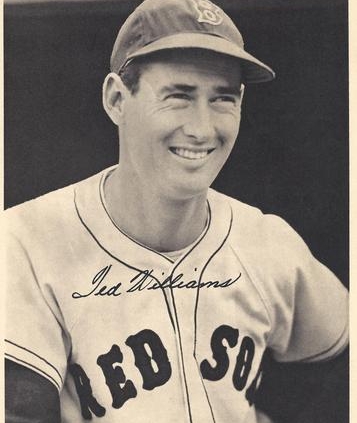July 14, 1946: Ted Williams becomes first Red Sox batter to hit three home runs in one game at Fenway Park
 The 1946 Boston Red Sox spent only one day all season long out of first place—April 25. By the time this game got underway on July 14, nearly three months after that point, they had a nine-game lead. By the time the doubleheader was over, their lead was 11 games.
The 1946 Boston Red Sox spent only one day all season long out of first place—April 25. By the time this game got underway on July 14, nearly three months after that point, they had a nine-game lead. By the time the doubleheader was over, their lead was 11 games.
The first game was close and one in which a lot of runs were scored. Eight of Boston’s 11 runs were driven in by one player—number 9, Ted Williams. All of Williams’s RBIs came on three home runs: numbers 24, 25, and 26 of the season for the 27-year-old star, back in the major leagues after missing three seasons for military service during World War II. He had 82 RBIs and it was still just mid-July. This came just five days after the 1946 All-Star Game, held at Fenway Park, in which Williams homered twice and drove in five runs.
It was a game in which Boston’s starting pitcher, Joe Dobson, didn’t make it out of the first inning. Leading off was Cleveland left fielder George Case. He doubled. With one out, the center fielder, Pat Seerey, walked. Right fielder Hank Edwards singled, driving home Case. Shortstop (and manager) Lou Boudreau hit a three-run homer high into the screen above the left-field wall and the Indians had a 4-0 lead.
Dobson got another out, but when first baseman Jimmy Wasdell singled, manager Joe Cronin brought in Clem Dreisewerd in relief. Dreisewerd got catcher Jim Hegan to ground out to end the inning.
Cleveland right-hander Steve Gromek had a 19-9 season in 1945 but was 4-8 entering this game. He didn’t factor in a decision in this one, nor did Dobson. Gromek got through the first two innings without a run scoring. Before he came out to pitch the bottom of the third, he had a 5-0 lead after Boudreau doubled and third baseman Ken Keltner singled to start the Indians’ half of the third.
Gromek lost the lead in the third. Boston catcher Roy Partee singled. Dreisewerd struck out. Right fielder Leon Culberson singled, and Partee moved to second. Shortstop Johnny Pesky walked. With the bases loaded and just one out, center fielder Dom DiMaggio had a chance to do some damage, but Gromek struck him out.
That brought up Ted Williams. It was one of those times a pitcher might have been better served to have been told to intentionally walk in a run.
Williams hit a grand slam, the seventh of his career. It banged off the back wall of the visiting team’s bullpen in right field, and then bounced back onto the field of play.1
Second baseman Bobby Doerr singled and first baseman Rudy York doubled, and the score was tied, 5-5. Manager Boudreau called in Don Black to relieve.2 Black closed down the inning.
Dreisewerd retired all three Cleveland batters in the top of the fourth, and the Red Sox added another run, taking a 6-5 lead. Partee singled. Dreisewerd sacrificed him to second. Culberson grounded to short, and Partee advanced to third. Pesky reached on an error by shortstop Boudreau and Partee scampered home.
The score tilted the other way in the fifth. Boudreau doubled with one out and Keltner homered over everything in left field. Cleveland had regained the lead, 7-6.
After Wasdell lined out, catcher Jim Hegan doubled and the pitcher, Black, doubled, making the score 8-6. Jim Bagby relieved Dreisewerd and struck out Case for the final out.
Williams led off the bottom of the fifth, swung at the first pitch he saw, and hit another home run, over the Boston bullpen and into the runway between the bleachers and grandstand. (At the time, the visitors’ bullpen was the one that extended to center field and the Red Sox bullpen was the one closest to the right-field grandstand.) It took a high bounce and went into the grandstand seats.3 It was 8-7, Indians.
The Indians re-established the two-run lead in the sixth when Seerey hit a one-out single and Boudreau hit a two-out double. The Red Sox hit a pair of singles in the bottom of the inning but did not score.
The Indians made it 10-7 in the seventh, adding yet another run on a leadoff triple by Hegan and a one-out fly ball by Case.
Williams led off the bottom of the seventh with a single, his third hit of the game. Doerr also singled, with Williams going to third. Black was relieved by Joe Berry. He got York to ground into a double play, but Williams scored, so the lead was down to 10-8.
Boudreau doubled to lead off the eighth but did not score.
The Red Sox went back on the attack after one out in the bottom of the eighth. Culberson singled. First baseman Wasdell committed an error on a ball hit to him by Pesky, and Culberson made it to third base. DiMaggio hit a high fly ball to first base for the second out of the inning.
Ted Williams came to bat and hit his third home run of the game, close to the right-field foul pole, giving Boston back the lead, 11-10.4
Tex Hughson relieved Bagby in the ninth, and—while he gave up two singles in a game that featured 34 base hits (18 by Cleveland 16 by Boston)—he got the three requisite outs and the game was finally over.
Berry bore the loss, of course. Bagby got the win.5 With his three home runs, Williams had—as noted—driven in eight of Boston’s 11 runs. Each home run was off a different pitcher. He became the first Red Sox batter to hit three home runs in a game at Fenway Park.6
It was the first time Williams had hit three homers in a game, whatever the location. He did it twice more, both in 1957: May 8 and June 13.
Boudreau himself had been no slouch. Left off the All-Star team in 1946, Boudreau went 5-for-5 with a home run and four consecutive doubles—12 total bases to Williams’ 13.
There was one more game to play. The Red Sox swept, winning 6-4. In the third inning of the second game, Boudreau implemented a defensive shift, a “Williams shift” as Cleveland’s Plain Dealer termed it. “Hoping to cope with the powerful pull hitter’s blasts, Boudreau moved all of his infielders between first and second base and put two outfielders in right field. … Williams joined in the laughing when he grounded to Boudreau.”7 They put on the shift again in the sixth, but Williams walked on four pitches. After the game, Williams said, “If everybody starts playing me like that, I guess I’ll have to turn around and hit ’em righthanded.”8
The doubleheader drew 31,581. Despite a combined total of 51 base hits, the two games took 2:32 and 2:12, respectively, to play.
The Indians finished the season in sixth place, 38 games behind the Red Sox. The Red Sox lost the World Series in seven games to the St. Louis Cardinals.
Sources
In addition to the sources cited in the Notes, the author consulted Baseball-Reference.com and Retrosheet.org.
https://www.baseball-reference.com/boxes/BOS/BOS194607141.shtml
https://www.retrosheet.org/boxesetc/1946/B07141BOS1946.htm
Notes
1 Burt Whitman, “Williams Pounds Out Three Home Runs, Sox Win, 11-10, 6-4, Lead by 11 Games,” Boston Herald, July 15, 1946: 1, 11.
2 Gromek gave up six home runs to Ted Williams over the course of their overlapping careers. Besides the one in this game, he also surrendered homers 155, 205, 263, 437, and 354. Gromek finished the 1946 season with a 5-15 record.
3 Gerry Moore, “Sox Beat Indians Twice to Take 11-Game Lead,” Boston Globe, July 15, 1946: 1, 6.
4 This is the foul pole known in later years as the Pesky Pole. The sports-page cartoon on page 11 in the July 15 Boston Herald shows the locations of the three home runs, as does the front-page cartoon by Gene Mack in the Boston Globe.
5 Bagby finished the season 7-6. Berry finished his season 3-7.
6 Hitting three homers in a game at Fenway had been done once before, but by a visiting player—Ken Keltner, on May 25, 1939.
7 “Boudreau Uses ‘Williams Shift,’” Cleveland Plain Dealer, July 15, 1946: 16.
8 “Boudreau Uses ‘Williams Shift.’”
Additional Stats
Boston Red Sox 11
Cleveland Indians 10
Game 1, DH
Fenway Park
Boston, MA
Box Score + PBP:
Corrections? Additions?
If you can help us improve this game story, contact us.


